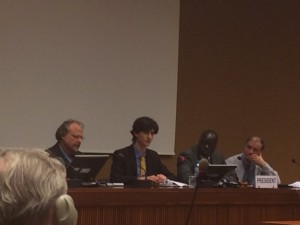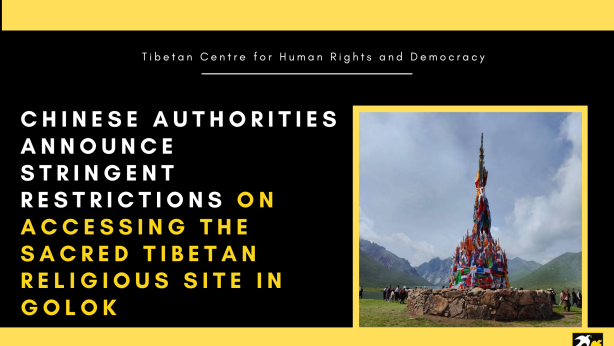TCHRD highlights human rights violations in Tibet at ongoing UNHRC session

Every year the United Nations Human Rights Council (UNHRC) has three regular sessions. The session in March is usually the most important. The March session is attended by top government officials and more NGOs than the other sessions. To accommodate the large number of officials and participants, the March session is one week longer than the other regular sessions.
This year the March session began on 2 March and will last until 27 March. Given the ongoing and serious human rights violations in Tibet, TCHRD took the opportunity to send two senior researchers to the UNHRC to discuss the situation in Tibet. On Friday 13 March, the International Fellowship of Reconciliation (IFOR) organized a side event on religious repression in East Asia. John Gaudette, a senior researcher at TCHRD, participated in the event as a panelist. The other panelists included the UN Special Rapporteur on Religious Freedom and Belief Professor Heiner Bielefeld and Derek Brett, IFOR’s representative to the UN in Geneva. The event was moderated by Dr Ojot Miru Ojulu from the Lutheran World Federation.
Mr. Bielefeld discussed his recent country visit to Vietnam and the parallels between the situation in Vietnam and Tibet. In particular, he focused on efforts by governments to control and harness religions. In response to questions, Mr. Bielefeld emphasized that the law must be used to protect people from the government rather than enabling repression. He specifically highlighted attempts at administratively controlling reincarnation as an absurd practice.
Mr. Gaudette spoke about the on-going religious repression in Tibet and the targeting of religious leaders who speak up for their community. A Chinese diplomat attended the event and made a statement during the question and answer session. The diplomat asserted that the Chinese government guarantees freedom of religion, invests resources in Tibet, and accused Mr. Gaudette of mixing criminal and religious issues. Both Mr. Gaudette and Mr. Bielefeld emphasized that real rule of law involved giving citizens a shield from government intrusion rather than arming the government with a sword.
Mr. Brett spoke about the increasing protections of conscious objectors in South Korea. The event concluded with a short statement about the risks posed by mining in sacred places in Tibet that will harm religious rights and can impact the environment in Tibet and neighboring States.
Later the same day, Mr. Gaudette made a statement on behalf of IFOR during the Item III General Debate. The two-minute statement emphasized the health and education situation in the Tibet Autonomous Region. Relying on official statistics from the People’s Republic of China (PRC), the statement said in eight areas the situation in the Tibet Autonomous Region is worse than anywhere in the PRC. The eight areas are life expectancy, infant mortality, childhood malnutrition, maternal mortality ratios, illiteracy rates, and healthcare system for children under the age of 3 and 7, and pregnant women.
China exercised its right to reply and responded with the usual official line saying that the claims are baseless and that the situation in Tibet has improved because of Chinese rule.


